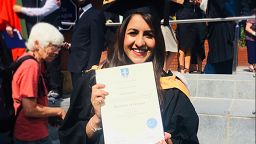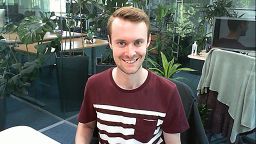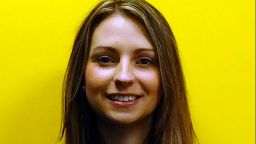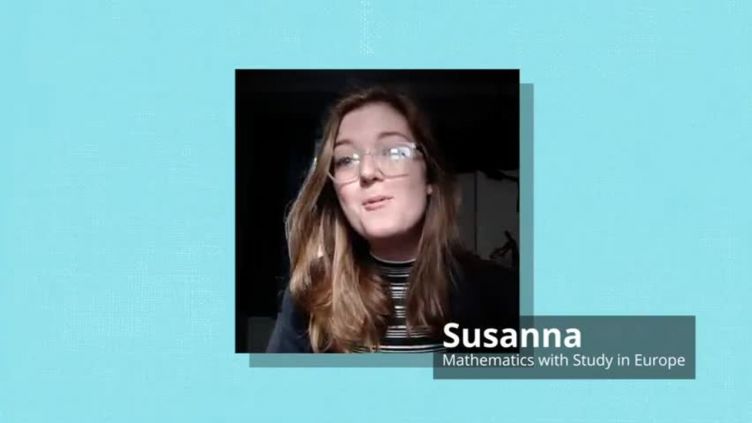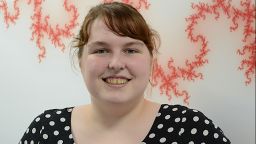Mathematics with German MMath
2024-25 entrySpend a year of your degree at one of our partner universities in Germany, studying mathematics in German. When you’re in Sheffield, you’ll spend two thirds of your time studying mathematics and the rest of your time developing your German language abilities.
Key details
- A Levels AAB
Other entry requirements - UCAS code G1R2
- 4 years / Full-time
- September start
- Find out the course fee
- Foreign language study
- Study abroad
- View 2025-26 entry
Explore this course:
Course description
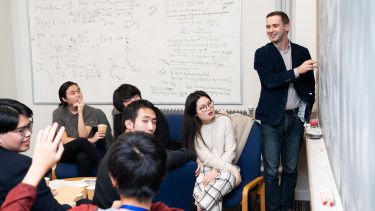
Become fluent in German while grappling with some of the most complex maths problems, as you develop into a creative problem-solver.
Why choose to study one subject, when you can follow your twin passions with this mathematics with German degree at the University of Sheffield.
You’ll spend around two thirds of your time on maths, one third studying German language and culture. Beginning with the essentials you’ll need for the rest of your degree – calculus, algebra, data science, and more – you’ll go on to develop programming skills using Python and R, and learn to present your work as a professional mathematician using LaTeX.
In your German studies, you’ll have seminars and weekly meetings with a native speaker, completing a project and presentation in German.
Year two will see you taking on increasingly complex problems. You’ll choose whether you want to focus on pure maths, or applied topics that are useful in industries like finance. There is also time dedicated for you to prepare for your year abroad – which you’ll spend studying maths at one of our partner universities in Germany.
When you return to Sheffield for your final year, you’ll have the skills, knowledge and experience to go in lots of different directions in mathematics. So a final research project is a good way to test what interests you the most.
And you’ll be working closely with one of our staff to tackle a complex research question. Together, we’ll mould you into a candidate that would be prized in academia, or any graduate position you choose.
Why study this course?
- Immersive German experience - full academic year at a German university, studying mathematics in German.
- Leading maths research - 96% of our research is rated as world-leading or internationally excellent, according to the Research Excellence Framework 2021.
- Everyone is welcome - there’s a place at Sheffield for everyone who enjoys mathematics. Find a warm welcome at our active student society (SUMS), regular maths challenges and a dedicated LGBT+ student group for maths students.
- Set up for a successful career - careers and employability skills are built into our maths degree programmes, and major employers like Goldman Sachs, Unilever, and the NHS hire our graduates to solve problems.
- Extended research projects - investigate a real-world problem of your choice in your final year research project, alongside an active researcher. This will also help you hone those software skills, so you’ll know how to present maths and statistics and other technical information.
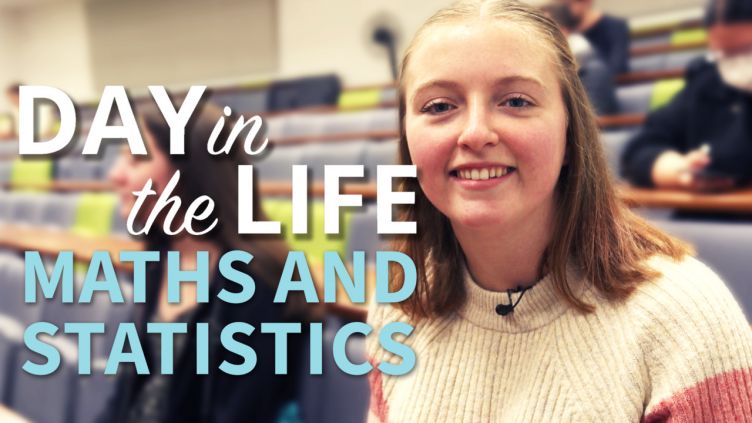
Modules
A selection of modules are available each year - some examples are below. There may be changes before you start your course. From May of the year of entry, formal programme regulations will be available in our Programme Regulations Finder.
Choose a year to see modules for a level of study:
UCAS code: G1R2
Years: 2023
Core modules:
- Mathematics Core
-
Mathematics Core covers topics which continue school mathematics and which are used throughout the degree programmes: calculus and linear algebra, developing the framework for higher-dimensional generalisation. This material is central to many topics in subsequent courses. At the same time, small-group tutorials with the Personal Tutor aim to develop core skills, such as mathematical literacy and communication, some employability skills and problem-solving skills.
40 credits - Foundations of Pure Mathematics
-
The module aims to give an overview of basic constructions in pure mathematics; starting from the integers, we develop some theory of the integers, introducing theorems, proofs, and abstraction. This leads to the idea of axioms and general algebraic structures, with groups treated as a principal example. The process of constructing the real numbers from the rationals is also considered, as a preparation for “analysis”, the branch of mathematics where the properties of sequences of real numbers and functions of real numbers are considered.
20 credits - Probability and Data Science
-
Probability theory is branch of mathematics concerned with the study of chance phenomena. Data science involves the handling and analysis of data using a variety of tools: statistical inference, machine learning, and graphical methods. The first part of the module introduces probability theory, providing a foundation for further probability and statistics modules, and for the statistical inference methods taught here. Examples are presented from diverse areas, and case studies involving a variety of real data sets are discussed. Data science tools are implemented using the statistical computing language R.
20 credits - German Advanced 1
-
Assuming a good A level in the language or equivalent, this unit aims to provide an initial preparation for a prolonged professional, academic or recreational stay in a country where the language is spoken and introduces the full range of linguistic and cultural skills required to engage in authentic and spontaneous interaction with native speakers (CEF level B2-). Based on 33 hours of small group (15-20) interactive seminars and tutorials predominantly delivered in the foreign language, the unit also comprises 67 hours of monitored private study. https://www.sheffield.ac.uk/mltc/lfa/courses/german/stage_3a
10 credits - German Advanced 2
-
Assuming successful completion of the Advanced 1 unit or equivalent, this unit aims to consolidate an initial preparation for a prolonged professional, academic or recreational stay in a country where the language is spoken and introduces the full range of linguistic and cultural skills required to engage in authentic and spontaneous interaction with native speakers (CEF level B2). Based on 36 hours of small group (15-20) interactive seminars and tutorials predominantly delivered in the foreign language, the unit also comprises 64 hours of monitored private study. https://www.sheffield.ac.uk/mltc/lfa/courses/german/stage_3b
10 credits
A student will take 10 credits from this group:
- German Project Advanced 1
-
This unit aims to enable students at an 'Advanced' level of competence in the language to work semi-independently, exploring critically a specialised topic normally related to their main field of study, in order to acquire subject-specific terminology and basic discursive skills in the language, as well as develop sound research skills. Through weekly tutorials, students will be guided and suppported in their completion of a written portfolio (1,500 words) and their preparation of an oral presentation summarizing their research and demonstrating their acquisition of relevant academic and linguistic skills. https://www.sheffield.ac.uk/mltc/lfa/courses/german/project_advanced
10 credits - German Project Advanced 2
-
This unit aims to enable students at an 'Advanced' level of competence in the language to work semi-independently, exploring critically a specialised topic normally related to their main field of study, in order to acquire subject-specific terminology and basic discursive skills in the language, as well as develop sound research skills. Through weekly tutorials, students will be guided and suppported in their completion of a written portfolio (1,500 words) and their preparation of an oral presentation summarizing their research and demonstrating their acquisition of relevant academic and linguistic skills. https://www.sheffield.ac.uk/mltc/lfa/courses/german/project_advanced
10 credits
A student will take 10 credits from this group:
- German-English Tandem Advanced 1
-
This unit aims to enable students to develop their spoken proficiency and intercultural awareness in relation to the language they are studying through weekly meetings with a native-speaker partner and to acquire independent language learning skills through regular supervision from a language tutor and the completion of a personal planning and reflexive diary. Partners will reciprocally support each other in achieving their own pre-agreed goals, alternatively acting as learner and teacher, taking responsibility for their own learning and providing constructive opportunities for language practice and feedback to their partner. https://www.sheffield.ac.uk/mltc/lfa/courses/german/tandem
10 credits - German-English Tandem Advanced 2
-
This unit aims to enable students to develop their spoken proficiency and intercultural awareness in relation to the language they are studying through weekly meetings with a native-speaker partner and to acquire independent language learning skills through regular supervision from a language tutor and the completion of a personal planning and reflexive diary. Partners will reciprocally support each other in achieving their own pre-agreed goals, alternatively acting as learner and teacher, taking responsibility for their own learning and providing constructive opportunities for language practice and feedback to their partner. https://www.sheffield.ac.uk/mltc/lfa/courses/german/tandem
10 credits
In your second year, you’ll continue to develop your German language abilities while you build a powerful toolbox of mathematical techniques that you can apply to increasingly complex problems. Some module options include more project work. This gives you the chance to put your mathematics skills into practice in different contexts and scenarios that you might encounter when you start work after graduation. There is also time dedicated for you to prepare for your year abroad in third year.
- Mathematics Core II
-
Building on Level 1 Mathematics Core, Mathematics Core II will focus on foundational skills and knowledge for both higher mathematics and your future life as a highly skilled, analytically-astute worker. Mathematical content will focus on topics that are vital for all areas of the mathematical sciences (pure, applied, statistics), such as vector calculus and linear algebra. This will help develop your analytic and problem solving skills. Alongside this, you will continue to develop employability skills, building on Level 1 Core. Finally, there will be opportunities to learn and reflect on social, ethical, and historical aspects of mathematics, which will enrich your understanding of the importance of mathematics in the modern world.
30 credits - Analysis and Algebra
-
This module will build on the theory built in Level 1 'Foundations of Pure Mathematics', focusing on the twin pillars of analysis and algebra. These are not only fundamental for pure mathematics at higher levels, but provide rigorous theory behind core concepts that are used throughout the mathematical sciences. Whilst to some extent you have been doing analysis and algebra since you were at school, here you will be going much deeper. You will examine why familiar tools, like differentiation and integration, actually work. Familiar objects, such as vectors, differential operators, and matrices, will be unpacked; powerful, formal properties of these objects proved. Ultimately, this rigorous foundation will enable you to extend these tools and concepts to tackle a far greater set of problems than before.
20 credits - Statistical Inference and Modelling
-
Statistical inference and modelling are at the heart of data science, a field of rapidly-growing importance in the modern word. This module develops methods for analysing data, and provides a foundation for further study of probability and statistics at higher Levels. You will learn about a range of standard probability distributions beyond those met at Level 1, including multivariate distributions. You will learn about sampling theory and summary statistics, and their relation to data analysis. You will discover how to parametrise various types of statistical model, learn techniques for determining whether one model is 'better' than another for understanding a dataset, and learn how to ascertain how good a statistical model is at explaining trends in data. The software package R will be used throughout.
20 credits - German Placement Preparation
-
The aim of this unit is to provide linguistic, cultural and practical preparation to students about to undertake an extended work placement or study exchange abroad. Students will research their destination (region, institution, etc.) and learn how to carry out a broad range of practical and study-related tasks using the language, including securing a residence or work permit, travelling throughout the country, arranging accommodation, registering for a course of study, opening a bank account, registering with and consulting a doctor, translating forms and other documents, taking lecture and seminar notes, writing letters, reports and/or essays, etc. https://www.sheffield.ac.uk/mltc/lfa/courses/german/placement_preparation
10 credits - German Higher Advanced 1
-
Assuming a one-year post-A-level study of the language or equivalent, this module aims to provide a full linguistic and cultural preparation for learners wishing to undertake an extended professional, academic or recreational stay in a country where the language is spoken and to expand the range of linguistic and cultural skills required to operate effectively in most situations encountered when engaging with native speakers (CEF level B2+). Based on 33 hours of small group (15-20) interactive seminars almost exclusively delivered in the foreign language, the unit also comprises 67 hours of monitored private study. https://www.sheffield.ac.uk/mltc/lfa/courses/german/stage_4a
10 credits - German Higher Advanced 2
-
Assuming successful completion of the Higher Advanced 1 unit or equivalent, this module aims to consolidate the full linguistic and cultural preparation of learners wishing to undertake an extended professional, academic or recreational stay in a country where the language is spoken and to consolidate the full range of linguistic and cultural skills required to operate effectively in most situations encountered when engaging with native speakers (CEF level C1). Based on 36 hours of small group (15-20) interactive seminars almost exclusively delivered in the foreign language, the unit also comprises 64 hours of monitored private study. https://www.sheffield.ac.uk/mltc/lfa/courses/german/stage_4b
10 credits
A student will take 10 credits from this group:
- Stochastic Modelling
-
Many things about life are unpredictable. Consequently, it often makes sense to incorporate some randomness in mathematical models of natural and physical processes. Such models are called 'stochastic models' and are the study object of this module. We will learn about a number of general models for processes where the state of a system is fluctuating randomly over time. Examples might include the length of a queue, the size of a reproducing population, or the quantity of water in a reservoir. We will cover various techniques for analysis of such models, setting the student up for further study of stochastic processes and probability at levels 3 and 4.
10 credits - Group Theory
-
A group is one of the most foundational objects in mathematics. It just consists of a set, together with a way of combining two objects in that set to create another object in an internally-consistent fashion. Familiar examples abound: integers with addition, real numbers with multiplication, symmetries of the square, and so on. In this module, you will learn about formal properties of groups in general, including famous results like the orbit-stabiliser theorem. You will also learn about important foundational examples, such as number, matrices, and symmetries. You will learn how the general framework of groups allows you to prove theorems that pertain to all these examples in one go. This provides a great example of the power and beauty of abstraction, a feature of pure mathematics that underlies the entire module.
10 credits - Mathematics and Statistics in Action
-
In this project module, you will investigate one or more case studies of using mathematics and statistics for solving empirical (i.e. 'real world') problems. These case studies will illustrate the process of mathematical and statistical modelling, whereby real-world questions are translated to mathematical and/or statistical questions. Students will see how techniques learned earlier in their degree can be used to explore these problems. There will be a mix of individual and group projects to choose from, and some projects may involve the use of R or Python, but 'MAS116 Mathematical Investigations Skills' is not a prerequisite. Students will be expected to work independently (either individually or in a small group). However, the topic and scope of each piece of project work will be clearly defined by the lecturer in charge of the topic.
10 credits
A student will take 10 credits from this group:
- German-English Tandem Higher Advanced 1
-
Students will be required to work in collaboration with a native-speaker with whom they will communicate in the target language. At the start of the module, students will exercise responsibility for the organisation of their own learning, establish and maintain contact with their partners, negotiate and set objectives; and seek and offer the correction of language errors. They should give proof of effective time-management, sequence sessions logically to demonstrate management of learning and demonstrate use of reviewing and evaluating procedures. They will be required to sign a learning contract and to keep a learner diary, in which they will record progress made, plan their next steps and reflect on their work during the semester. Their progress will be monitored in advisory and counselling sessions with MLT Centre Tutors. https://www.sheffield.ac.uk/mltc/lfa/courses/german/tandem
10 credits - German-English Tandem Higher Advanced 2
-
Students will be required to work in collaboration with a native speaker with whom they will communicate in the target language. At the start of the module, students will exercise responsibility for the organisation of their own learning, establish and maintain contact with their partners, negotiate and set objectives; and seek and offer the correction of language errors. They should give proof of effective time-management, sequence sessions logically to demonstrate management of learning and demonstrate use of reviewing and evaluating procedures. They will be required to sign a learning contract and to keep a learner diary, in which they will record progress made plan their next steps and reflect on their work during the semester. Their progress will be monitored in advisory and counselling sessions with MLT Centre tutors. https://www.sheffield.ac.uk/mltc/lfa/courses/german/tandem
10 credits - German Project Higher Advanced 1
-
The aims are to enable students to work independently and collaboratively in German, to foster the acquisition of subject-specific terminology and discourse in German; to encourage interaction with native speakers of German, by e-mail or face-to-face. Students will be expected to investigate an agreed topic closely related to their main course of study. This will entail devising a project proposal and plan, gathering information from a range of written and spoken sources (normally including German native-speakers), and synthesising this to form the basis of a formal written report and a structured oral presentation. On completion, students should be able to: collaborate successfully with native-speakers of German: use international e-mail links to do so where appropriate; analyse information, distinguishing fact from opinion and main ideas from supporting detail; and present findings in speech and writing using formal register and - where appropriate - subject-specific language. https://www.sheffield.ac.uk/mltc/lfa/courses/german/project_higher_advanced
10 credits - German Project Higher Advanced 2
-
The aims are to enable students to work independently and collaboratively in German, to foster the acquisition of subject-specific terminology and discourse in German; to encourage interaction with native speakers of German, by e-mail or face-to-face. Students will be expected to investigate an agreed topic closely related to their main course of study. This will entail devising a project proposal and plan, gathering information from a range of written and spoken sources (normally including German native-speakers), and synthesising this to form the basis of a formal written report and a structured oral presentation. On completion, students should be able to: collaborate successfully with native-speakers of German: use international e-mail links to do so where appropriate; analyse information, distinguishing fact from opinion and main ideas from supporting detail; and present findings in speech and writing using formal register and - where appropriate - subject-specific language. https://www.sheffield.ac.uk/mltc/lfa/courses/german/project_higher_advanced
10 credits
Unrestricted appropriate MLT units to the value of 10 credits.
You will spend your third year studying maths at one of our partner universities in Germany.
Core modules:
- Study Abroad
-
contact convenor for more infortmation
100 credits - German Year Abroad 1
-
This unit aims to enable students to heighten their awareness of cultural and linguistic aspects of the country where they are studying, encouraging their social integration and fostering their independent and/or collaborative study in the foreign language. Students will complete a diary in which they will record and reflect upon their linguistic and cultural integration progress over a period of at least 10 weeks. They will also contribute to a blog intended to share language learning advice and practical tips about living in the region and country with other students currently abroad or preparing for a year abroad. https://www.sheffield.ac.uk/mltc/lfa/courses/german/year_abroad
10 credits - German Year Abroad 2
-
This unit aims to enable students to heighten their awareness of cultural and linguistic aspects of the country where they are studying, encouraging their social integration and fostering their independent and/or collaborative study in the foreign language. Students will complete a diary in which they will record and reflect upon their linguistic and cultural integration progress over a period of at least 10 weeks. They will also contribute to a blog intended to share language learning advice and practical tips about living in the region and country with other students currently abroad or preparing for a year abroad. https://www.sheffield.ac.uk/mltc/lfa/courses/german/year_abroad
10 credits
Core modules:
- German Proficient 1
-
Assuming a solid, two year post-A-level study of the language and, ideally, a prolonged stay in a country where the language is spoken, this unit aims to provide the linguistic and cultural skills required to operate as a near-native speaker in the target country, whether for professional, academic or recreational purposes, and to develop strategies and techniques to become a fully autonomous, life-long learner of the language and culture (CEF level C1+). Based on 33 hours of small group (15-20) interactive seminars almost exclusively delivered in the foreign language, the unit also comprises 67 hours of monitored private study. https://www.sheffield.ac.uk/mltc/lfa/courses/german/stage_5a
10 credits - German Proficient 2
-
Assuming successful completion of the Proficient 1 unit or equivalent, this unit aims to perfect the linguistic and cultural skills required to operate as a near-native speaker in the target country, whether for professional, academic or recreational purposes, and to consolidate the strategies and techniques to become a fully autonomous, life-long learner of the language and culture (CEF level C2). Based on 36 hours of small group (15-20) interactive seminars almost exclusively delivered in the foreign language, the unit also comprises 64 hours of monitored private study. https://www.sheffield.ac.uk/mltc/lfa/courses/german/stage_5b
10 credits - Mathematics and Statistics Project
-
This module forms the final part of the SoMaS project provision at Level 4 and involves the completion, under the guidance of a research active supervisor, of a substantial project on an advanced topic in Mathematics or Statistics. Training is provided in the use of appropriate computer packages for the presentation of mathematics and statistics and guidance on the coherent and accurate presentation of technical information.
45 credits - German Project Proficient 2
-
This unit aims to enable students at a 'Proficient' level of competence in the language to engage critically and independently with a highly specialised topic normally closely related to their main field of study in order to acquire expert use of subject-specific terminology and discourse and to consolidate advanced research skills in relation to the language and field of study. Working under regular supervision, students will complete a written portfolio (2,500 - 3,000 words) and prepare a structured oral presentation summarizing authoritatively their research for a specialist audience and demonstrating their acquisition of relevant academic and linguistic skills. https://www.sheffield.ac.uk/mltc/lfa/courses/german/project_proficient
10 credits
Optional modules:
- Generalised Linear Models
-
This module introduces the theory and application of generalised linear models. These models can be used to investigate the relationship between some quantity of interest, the "dependent variable", and one or more "explanatory" variables; how the dependent variable changes as the explanatory variables change. The term "generalised" refers to the fact that these models can be used for a wide range of different types of dependent variable ,continuous, discrete, categorical, ordinal etc. The application of these models is demonstrated using the programming language R.
15 credits - Medical Statistics
-
This module introduces an important application of statistics: medical research, specifically, the design and analysis of clinical trials. For any new drug to be approved by a regulator (such as the Medicines and Healthcare products Regulatory Agency in the UK) for use on patients, the effectiveness of the drug has to be demonstrated in a clinical trial. This module explains how clinical trials are designed and how statistical methods are used to analyse the results, with a particular focus on 'survival' or 'time-to-event' analysis.
15 credits - Sampling Theory and Design of Experiments
-
Whereas most statistics modules are concerned with the analysis of data, this module is focussed on the collection of data. In particular, this module considers how to collect data efficiently: how to ensure the quantities of interest can be estimated sufficiently accurately, using the smallest possible sample size. Three settings are considered: sample surveys (for example when conducting an opinion poll), physical experiments, as may be used in industry, and experiments involving predictions from computer models, where there is uncertainty in the computer model prediction.
15 credits - Time Series
-
This module considers the analysis of data in which the same quantity is observed repeatedly over time (e.g., recordings of the daily maximum temperature in a particular city, measured over months or years). Analysis of such data typically requires specialised methods, which account for the fact that successive observations are likely to be related. Various statistical models for analysing such data will be presented, as well as how to implement them using the programming language R.
15 credits - Bayesian Statistics and Computational Methods
-
This module introduces the Bayesian approach to statistical inference. The Bayesian method is fundamentally different in philosophy from conventional frequentist/classical inference, and has been the subject of some controversy in the past, but is now widely used. The module also presents various computational methods for implementing both Bayesian and frequentist inference, in situations where obtaining results 'analytically' would be impossible. The methods will be implemented using the programming languages R and Stan, and some programming is taught alongside the theory lectures.
30 credits - Machine Learning
-
Machine learning lies at the interface between computer science and statistics. The aims of machine learning are to develop a set of tools for modelling and understanding complex data sets. It is an area developed recently in parallel between statistics and computer science. With the explosion of “Big Data”, statistical machine learning has become important in many fields, such as marketing, finance and business, as well as in science. The module focuses on the problem of training models to learn from training data to classify new examples of data.
15 credits - Advanced Topics in Algebra A
-
Algebra is a very broad topic, relating many disparate areas of mathematics, from mathematical physics to abstract computer science. It was noticed that the same underlying structures arose in a number of different areas, and this led to the study of the abstract structures. This module studies some of the algebraic structures involved: fields, groups and Galois Theory; rings and commutative algebra, and gives applications to, for example, number theory, roots of polynomials and algebraic geometry.
30 credits - Algebraic Topology
-
This unit will cover algebraic topology, following on from metric spaces. Topology studies the shape of spaces, with examples such as spheres, the Möbius Band, the Klein bottle, the torus and other surfaces. The first task is to formalise the notion of space, and to work out when a given space can be continuously deformed into another, where stretching and bending is allowed, but cutting and glueing is not. Algebraic topology builds a powerful bridge between shapes and algebra, enabling the use of familiar algebraic techniques from linear algebra and group theory to study spaces and their deformations.
30 credits - Financial Mathematics
-
The discovery of the Capital Asset Pricing Model by William Sharpe in the 1960's and the Black-Scholes option pricing formula a decade later mark the beginning of a very fruitful interaction between mathematics and finance. The latter obtained new powerful analytical tools while the former saw its knowledge applied in new and surprising ways. (A key result used in the derivation of the Black-Scholes formula, Ito's Lemma, was first applied to guide missiles to their targets; hence the title 'rocket science' applied to financial mathematics). This course describes the mathematical ideas behind these developments together with their application in modern finance, and includes a project.
15 credits - Functional Analysis
-
Functional analysis is the study of infinite-dimensional vector spaces equipped with extra structure. Such spaces arise naturally as spaces of functions. As well as being a beautiful subject in its own right, functional analysis has numerous applications in other areas of both pure and applied mathematics, including Fourier analysis, study of the solutions of certain differential equations, stochastic processes, and in quantum physics. In this unit we focus on Banach spaces and especially Hilbert spaces - complete vector spaces equipped with an inner product - and linear maps between Hilbert spaces. Applications of the theory we examine include Fourier series and the Fourier transform, and differential equations.
15 credits - Mathematical Modelling of Natural Systems
-
Mathematical modelling enables insight into a wide range of scientific problems. This module will provide a practical introduction to techniques for modelling natural systems. Students will learn how to construct, analyse and interpret mathematical models, using a combination of differential equations, scientific computing and mathematical reasoning. Students will learn the art of mathematical modelling: translating a scientific problem into a mathematical model, identifying and using appropriate mathematical tools to analyse the model, and finally relating the significance of the mathematical results back to the original problem. Study systems will be drawn from throughout the environmental and life sciences.
15 credits - Further Topics in Number Theory
-
Elementary number theory has been seen in a number of earlier modules. To go further, however, additional input is needed from other areas of pure mathematics - analysis and algebra. For example, the distribution of prime numbers is intricately related to the complex analytic properties of the Riemann zeta function And one can ask similar questions to those we ask about prime numbers for the rational numbers over, for example, quadratic fields. This module will treat examples of further topics in number theory, accessible with the aid of advanced mathematical background.
15 credits - Probability and Random Graphs
-
Random graphs were studied by mathematicians as early as the 1950s. The field has become particularly important in recent decades as modern technology gives rise to a vast range of examples, such as social and communication networks, or the genealogical relationships between organisms. This course studies a range of models of random trees, graphs and networks, alongside probabilistic ideas that are needed to analyse their different properties. The precise material covered in this module may vary according to the lecturer's interests.
15 credits - Probability with Measure Theory
-
Probability is a relatively new part of mathematics, first studied rigorously in the early part of 20th century. This module introduces the modern basis for probability theory, coming from the idea of 'measuring' an object by attaching a non-negative number to it. This might refer to its length or volume, but also to the probability of an event happening. We therefore find a close connection between integration and probability theory, drawing upon real analysis. This rigorous theory allows us to study random objects with complex or surprising properties, which can expand our innate intuition for how probability behaves. The precise material covered in this module may vary according to the lecturer's interests.
15 credits - Stochastic Processes and Finance
-
Stochastic processes are models that reflect the wide variety of unpredictable ways in which reality behaves. In this course we study several examples of stochastic processes, and analyse the behaviour they exhibit. We apply this knowledge to mathematical finance, in particular to arbitrage free pricing and the Black-Scholes model.
30 credits - Further Topics in Mathematical Biology
-
This module focuses on the mathematical modelling of biological phenomena. The emphasis will be on deterministic models based on systems of differential equations. Examples will be drawn from a range of biological topics, which may include the spread of epidemics, predator-prey dynamics, cell biology, medicine, or any other biological phenomenon that requires a mathematical approach to understand. Central to the module will be the dynamic consequences of feedback interactions within biological systems. In cases where explicit solutions are not readily obtainable, techniques that give a qualitative picture of the model dynamics (including numerical simulation) will be used. If you did not take Scientific Computing at Level 2, you may still be able to enrol on this module, but you will need to obtain permission from the module leader first.
15 credits
The content of our courses is reviewed annually to make sure it's up-to-date and relevant. Individual modules are occasionally updated or withdrawn. This is in response to discoveries through our world-leading research; funding changes; professional accreditation requirements; student or employer feedback; outcomes of reviews; and variations in staff or student numbers. In the event of any change we'll consult and inform students in good time and take reasonable steps to minimise disruption.
Learning and assessment
Learning
You'll learn through lectures, seminars, problems classes, language classes and research projects. Some modules also include programming classes.
Assessment
You will be assessed in a variety of ways, depending on the modules you take. This can include quizzes, examinations, presentations, participation in tutorials, projects, coursework and other written work.
Programme specification
This tells you the aims and learning outcomes of this course and how these will be achieved and assessed.
Entry requirements
With Access Sheffield, you could qualify for additional consideration or an alternative offer - find out if you're eligible.
The A Level entry requirements for this course are:
AAB
including A in Maths and B in German
- A Levels + a fourth Level 3 qualification
- ABB, including A in Maths and B in German + B in a relevant EPQ; ABB, including A in Maths and B in German + B in A Level Further Maths
- International Baccalaureate
- 34, with 6 in Higher Level Maths (Analysis and Approaches) and 5 in Higher Level German
- BTEC Extended Diploma
- DDD in Engineering with Distinctions in all Maths units + an appropriate German language qualification
- BTEC Diploma
- DD + A in A Level Maths + an appropriate German language qualification
- Scottish Highers + 2 Advanced Highers
- AAABB + AB, including A in Maths and B in German
- Welsh Baccalaureate + 2 A Levels
- B + AA in Maths and German
- Access to HE Diploma
- Award of Access to HE Diploma in a relevant subject, with 45 credits at Level 3, including 36 at Distinction (to include Maths units) and 9 at Merit + an appropriate German language qualification
-
We will give your application additional consideration if you have passed the Sixth Term Examination Paper (STEP), STEP 2 or STEP 3, at grade 3 or above. We do not consider STEP results in place of a third A Level
The A Level entry requirements for this course are:
ABB
including A in Maths and B in German
- A Levels + a fourth Level 3 qualification
- ABB, including A in Maths and B in German + B in a relevant EPQ; ABB, including A in Maths and B in German + B in A Level Further Maths
- International Baccalaureate
- 33, with 6 in Higher Level Maths (Analysis and Approaches) and 5 in Higher Level German
- BTEC Extended Diploma
- DDD in Engineering with Distinctions in all Maths units + an appropriate German language qualification
- BTEC Diploma
- DD + A in A Level Maths + an appropriate German language qualification
- Scottish Highers + 2 Advanced Highers
- AABBB + AB, including A in Maths and B in German
- Welsh Baccalaureate + 2 A Levels
- B + AB, including A in Maths and B in German
- Access to HE Diploma
- Award of Access to HE Diploma in a relevant subject, with 45 credits at Level 3, including 30 at Distinction (to include Maths units) and 15 at Merit + an appropriate German language qualification
-
We will give your application additional consideration if you have passed the Sixth Term Examination Paper (STEP), STEP 2 or STEP 3, at grade 3 or above. We do not consider STEP results in place of a third A Level
You must demonstrate that your English is good enough for you to successfully complete your course. For this course we require: GCSE English Language at grade 4/C; IELTS grade of 6.5 with a minimum of 6.0 in each component; or an alternative acceptable English language qualification
Equivalent English language qualifications
Visa and immigration requirements
Other qualifications | UK and EU/international
If you have any questions about entry requirements, please contact the department.
Graduate careers
School of Mathematics and Statistics
Strong mathematics skills open all kinds of doors for our graduates: from banking, insurance and pensions, to software development at tech companies and encryption services at security agencies. They also work for businesses with vast amounts of data to process and inform new products and services.
Organisations that have hired Sheffield maths graduates include AstraZeneca, BAE Systems, Barclays, Bet365, Dell, Deloitte, Goldman Sachs, GSK, HSBC, IBM, Lloyds, PwC, Unilever, the Civil Service and the NHS. Lots of our students also go on to do PhDs at world top 100 universities.
Your career in mathematics and statistics
Modern Languages Teaching Centre
Modern languages graduates are sought after in a wide variety of areas. Many go on to careers in international business, marketing and related fields. University graduates work in the European Commission, the diplomatic service, the media and public administration. Others work as translators and interpreters, or opt for careers abroad.
School of Mathematics and Statistics

When new students join the School of Mathematics and Statistics, we want them to feel part of a community. At the heart of this is the Sheffield University Mathematics Society, or SUMS, who organise activities throughout the academic year – from charity fundraisers to nights out. Our students also take part in pizza lectures, rocket engineering projects, international maths challenges, and an LGBT+ support group for maths students.
Staff in the School of Mathematics and Statistics work on a wide range of topics, from the most abstract research in areas like algebraic geometry and number theory, to the calculations behind animal movements and black holes. They’ll guide you through the key concepts and techniques that every mathematician needs to understand and give you a huge range of optional modules to choose from.
The department is based in the Hicks Building, which has classrooms, lecture theatres, computer rooms and social spaces for our students. It’s right next door to the Students' Union, and just down the road from the 24/7 library facilities at the Information Commons and the Diamond.
School of Mathematics and StatisticsModern Languages Teaching Centre

Your foreign language modules are taught by the Modern Languages Teaching Centre (MLTC). The MLTC offers language courses to undergraduate and postgraduate students, staff and the public.
Including a modern language as part of your degree at Sheffield is a confident step into the wider world and you'll be graduating with skills that are highly valued by employers. You'll learn to communicate fluently in your chosen language and deepen your understanding of the cultural context of the countries where your language is spoken.
All this is achieved in a vibrant environment through dynamic, high-quality and innovative teaching that places you, as a student, at the cutting edge of the discipline.
MLTC students study at the Ella Armitage Building in the heart of our campus.
Modern Languages Teaching CentreWhy choose Sheffield?
The University of Sheffield
Number one in the Russell Group
National Student Survey 2023 (based on aggregate responses)
92 per cent of our research is rated as world-leading or internationally excellent
Research Excellence Framework 2021
Top 50 in the most international universities rankings
Times Higher Education World University Rankings 2023
Number one Students' Union in the UK
Whatuni Student Choice Awards 2023, 2022, 2020, 2019, 2018, 2017
Number one for teaching quality, Students' Union and clubs/societies
StudentCrowd 2023 University Awards
A top 20 university targeted by employers
The Graduate Market in 2023, High Fliers report
School of Mathematics and Statistics
Research Excellence Framework 2021
Fees and funding
Fees
Additional costs
The annual fee for your course includes a number of items in addition to your tuition. If an item or activity is classed as a compulsory element for your course, it will normally be included in your tuition fee. There are also other costs which you may need to consider.
Funding your study
Depending on your circumstances, you may qualify for a bursary, scholarship or loan to help fund your study and enhance your learning experience.
Use our Student Funding Calculator to work out what you’re eligible for.
Visit
University open days
We host five open days each year, usually in June, July, September, October and November. You can talk to staff and students, tour the campus and see inside the accommodation.
Subject tasters
If you’re considering your post-16 options, our interactive subject tasters are for you. There are a wide range of subjects to choose from and you can attend sessions online or on campus.
Offer holder days
If you've received an offer to study with us, we'll invite you to one of our offer holder days, which take place between February and April. These open days have a strong department focus and give you the chance to really explore student life here, even if you've visited us before.
Campus tours
Our weekly guided tours show you what Sheffield has to offer - both on campus and beyond. You can extend your visit with tours of our city, accommodation or sport facilities.
Apply
Contact us
- Telephone
- +44 114 222 3999
- maths.admiss@sheffield.ac.uk
The awarding body for this course is the University of Sheffield.
Recognition of professional qualifications: from 1 January 2021, in order to have any UK professional qualifications recognised for work in an EU country across a number of regulated and other professions you need to apply to the host country for recognition. Read information from the UK government and the EU Regulated Professions Database.
Any supervisors and research areas listed are indicative and may change before the start of the course.

